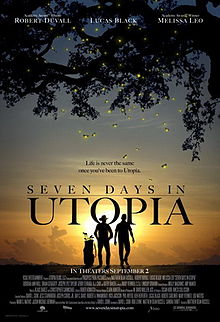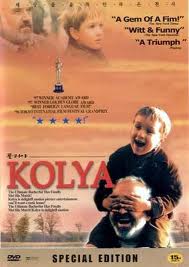“Learning to Love”

| None | Light | Moderate | Heavy | |
|---|---|---|---|---|
| Language | ||||
| Violence | ||||
| Sex | ||||
| Nudity |
What You Need To Know:
This film not only tells the story of an old, corrupt man and an innocent child, but also chronicles the collision of two cultures. The film gently and subtly suggest that humanity would do well to remember that its political enemies are populated by individuals, some of whom are innocent children. With breathtaking cinematography, the film is rich with symbolism. Despite those positive messages, however, the film does present morally ambiguous and reprehensible situations, such as the “fake marriage, ” some obscenities and implied fornication. This film would best appeal to a mature audience, especially those who enjoy cinematic art
Content:
(B, LL, S, N, A) Moral worldview where values of family, love & personal responsibility triumph over hedonistic pleasures; 2 obscenities, 3 profanities & 6 vulgarities; no violence; implied fornication, adultery & sexual innuendo; naked baby in bath; and, alcohol use
More Detail:
The story is set in Prague on the eve of the 1989 Velvet Revolution, when Czechoslovakia’s Russian invaders were finally overthrown. KOLYA’s main character is Frantisek“Franta”Louka, a 55-year old “confirmed bachelor” and cellist who once played for the renowned Czech Philharmonic Orchestra. Now, he is reduced to performing at funerals because of his lack of allegiance to the Communists occupying his country.
In his free time, he busies himself by dallying with other men’s wives. Desperately in need of money, he reluctantly agrees to marry a friend’s distant Russian niece, who needs Czech papers. The marriage will be a “fake marriage,” his friend assures him, and she will pay him handsomely for his cooperation. The niece turns out to be young and beautiful, but she also has a five-year-old son named Kolya (AndrejChalimon). To Louka’s chagrin, his new young wife promptly emigrates to Germany and leaves her little boy behind with his grandmother. The grandmother dies suddenly of a stroke, and Loukais abruptly saddled with Kolya.
The resulting relationship that develops between the Russian boy and the Czech bachelor is magical to behold. Gradually, the child wins Louka’sheart, and Kolya grows to trust Louka, calling him “Dad.” The middle-aged musician is transformed by his new responsibility. He forfeits his old life of philandering and takes the boy on a trip to the countryside, makes him toys and calls his former girlfriends to read Kolya bedtime stories.
This film not only tells the story of an old, corrupt man and an innocent child, but also chronicles the collision of two historically inimical cultures. The current political situation is a constant undercurrent. Scenes are often punctuated by news updates from Radio-Free Europe describing the burgeoning Velvet Revolution. The juxtaposition of the disreputable old Czech with the ingenuous Kolya turns the “bad Russian/good Czech” paradigm on its ear. The film gently and subtly suggest that humanity would do well to remember that its political enemies are populated by individuals and fellow human beings, some of whom are innocent children.
From an artistic perspective, Jan Sverak’scinematography is breathtaking. His frequent, intense close-ups serve to enrich the film’s meaning and vitality rather than to distract. The film is rich with symbolism. Kolya’s fascination with birds conveys the child’s sense of entrapment, and frequent light imagery, especially the play of light across the child’s face and hands, symbolizes the conflict between good and evil, truth and subterfuge. The acting is superb, and AndrejChalimon, who portrays Kolya, is without question one of the most natural and adorable children on the screen today. He is a far cry from the wise-cracking smart-alecks so ubiquitous in American movies today. Only once does his childish portrayal ring false. When Loukatakes Kolya fishing and reveals that Beaver Lake is devoid of beavers due to human encroachment, Kolya reacts by taking the Lord’s Name in vain.
As the plot suggests, KOLYA deals entirely with adult themes, despite the youth of its namesake. Essentially, its overall message is positive and moral, since Louka is morally transformed by his experience with Kolya. His metamorphosis is best illustrated by the beginning and ending scenes. In the first scene, Frantais playing his cello in a funeral hall, while Klara, who eventually becomes his lover, sings the twenty-third Psalm. Since he is seated directly behind her, Loukauses the bow of his instrument to lift her skirt while the oblivious Klarawarbles, much to the amusement of Louka’sfellow musicians. In the final scene, the twenty-third Psalm is again sung, this time in Kolya’s awestruck tones as he looks out over the clouds in an airplane. Irreverence, therefore, is replaced by veneration, just as Loukahas discarded his cynicism and sordid lifestyle to replace them with a new respect for fidelity and family life.
Despite those positive messages, however, the film does present morally ambiguous and reprehensible situations, such as the “fake marriage” that are too confusing for young minds. Some of KOLYA’s other questionable elements should be viewed from a European perspective, the character’s frequent use of alcohol, for example is less pernicious because it is so much more a part of the European tradition that it is in America. However, a child is too young to make a distinction. Furthermore, the film’s subtitles would probably prove too taxing for most young viewers. This film would best appeal to a mature audience, especially those who enjoy cinematic art.


 - Content:
- Content: 



